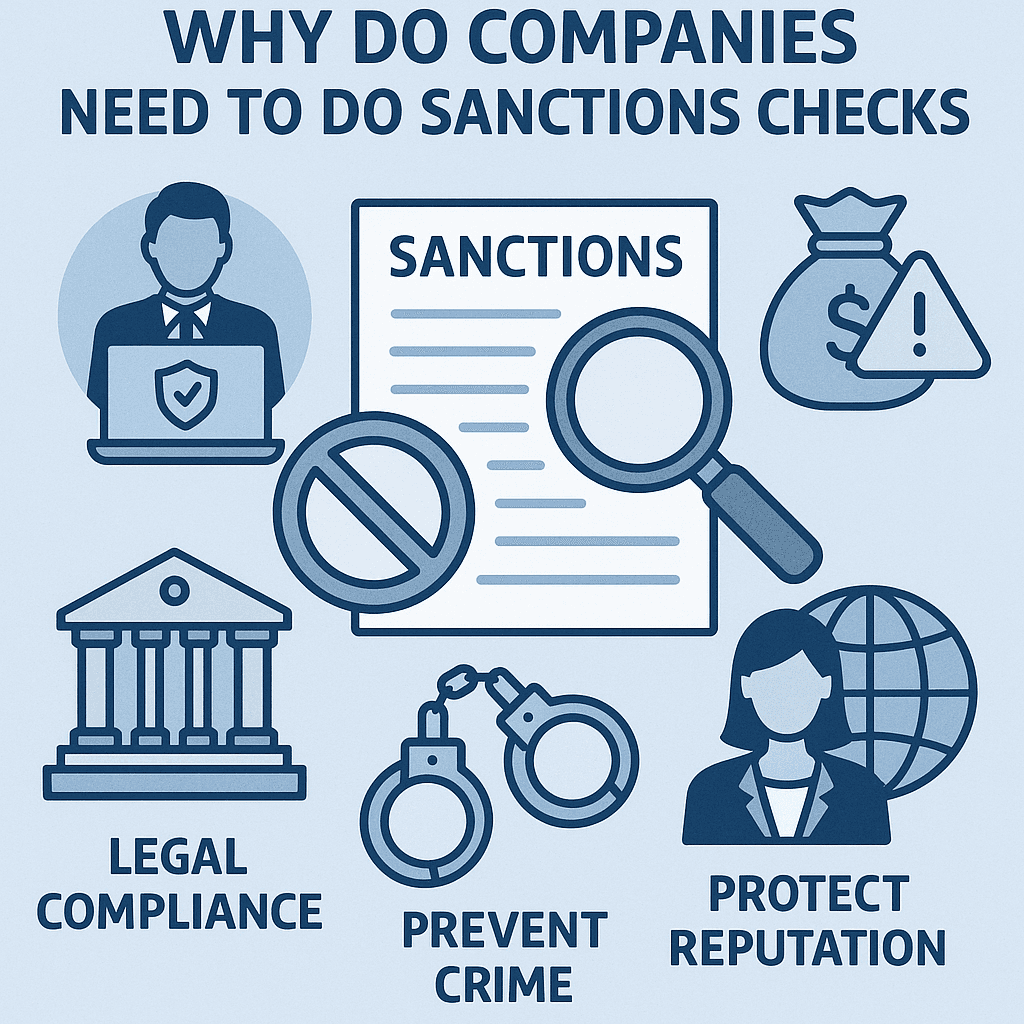9 Aug 2025
Key Global Sanctions Lists SMEs Should Be Screening Against
Learn which sanctions lists matter most for small and medium-sized enterprises, and how to choose the right ones based on your business operations and risk profile.

For small and medium-sized enterprises (SMEs), compliance can feel like navigating a maze. One of the first and most important decisions in setting up a sanctions screening process is choosing which sanctions lists to check against. The wrong choice—or ignoring certain lists—can expose your business to legal penalties, frozen transactions, reputational damage, and even loss of banking relationships.
In this guide, we break down the most critical sanctions lists and explain how SMEs can determine which apply to their operations.
Why Sanctions Lists Matter for SMEs
Sanctions lists are issued by governments and international bodies to prohibit trade or interaction with specific individuals, entities, vessels, or countries. They target threats like terrorism, money laundering, corruption, human rights abuses, and proliferation of weapons.
For SMEs, sanctions compliance is not just for large banks.
If you send or receive payments, import/export goods, work with international suppliers, or serve high-risk regions, sanctions apply to you.
Even indirect violations—such as dealing with a sanctioned entity via an intermediary—can result in enforcement action.
The Big 7 Sanctions Lists Every SME Should Know
Below are the most recognized sanctions lists globally, often used as the baseline for screening:
1. OFAC – Specially Designated Nationals (SDN) List (United States)
- Maintained by the U.S. Treasury’s Office of Foreign Assets Control (OFAC).
- Applies globally if your transactions involve U.S. persons, U.S. banks, or USD payments.
- Covers individuals, companies, and vessels subject to U.S. economic sanctions.
Why SMEs should care:
Even if you’re not based in the U.S., OFAC can enforce penalties extraterritorially for USD transactions or U.S.-linked trade.
2. United Nations Security Council Sanctions List
- Adopted by all UN member states.
- Covers terrorism, proliferation of nuclear weapons, and conflict-related sanctions.
- Obligates member countries to implement these sanctions into local law.
Why SMEs should care:
Many local laws reference the UN list directly. If you trade in multiple jurisdictions, this is often the common denominator.
3. European Union Consolidated Financial Sanctions List
- Applies to all EU member states.
- Covers asset freezes, trade restrictions, and travel bans.
- Frequently updated in response to geopolitical events.
Why SMEs should care:
If you are an EU-registered business or trade with EU entities, you must comply.
4. UK Sanctions List (OFSI)
- Managed by the Office of Financial Sanctions Implementation.
- Required for all UK businesses and anyone trading with UK persons.
- Includes both financial and trade sanctions.
Why SMEs should care:
Post-Brexit, the UK sanctions regime diverges from the EU, so both lists may need to be checked.
5. Swiss SECO Sanctions List
- Overseen by SECO (State Secretariat for Economic Affairs).
- Often aligns with UN/EU sanctions but sometimes has unique measures.
- Mandatory for Swiss companies and those doing significant business in Switzerland.
6. Australian DFAT Consolidated List
- Published by the Department of Foreign Affairs and Trade.
- Covers Australian autonomous sanctions and UN obligations.
- Important for Asia-Pacific trade compliance.
7. Canadian SEMA Sanctions List
- Maintained under the Special Economic Measures Act.
- Includes asset freezes, prohibitions, and restrictions.
- Applies to Canadian persons and entities, but also foreign companies interacting with Canada.
How to Decide Which Lists Apply to You
When selecting which lists to screen against, SMEs should consider:
- Your registration location (jurisdiction of incorporation)
- Where your customers and suppliers are based
- The currencies you transact in (USD, EUR, GBP can trigger multiple regimes)
- Industry-specific rules (shipping, defense, financial services have stricter requirements)
For example:
- An EU-based SME importing goods from Asia, paid in USD → Must screen EU, OFAC, UN.
- A UK-based law firm serving Middle Eastern clients → Must screen UK, UN, and possibly OFAC.
- A Canadian exporter selling to African NGOs → Must screen Canadian SEMA, UN, and possibly EU.
Best Practices for SMEs
- Use a consolidated screening tool like MatchAudit to check against multiple lists at once.
- Enable real-time updates—some lists change daily.
- Keep audit logs to prove due diligence during regulatory checks.
- Avoid list gaps—a single missed list can result in non-compliance.
Bottom line:
Sanctions compliance isn’t optional, even for small businesses. By screening against the right global sanctions lists, SMEs can protect themselves from costly mistakes and demonstrate to partners, banks, and regulators that they take compliance seriously.
MatchAudit simplifies this process by combining all major sanctions lists—including OFAC, UN, EU, UK, Swiss, Canadian, and Australian—into one easy-to-use screening platform for SMEs.
Related reading

Why Do Companies Need to Do Sanctions Checks?
Sanctions checks are essential for businesses to avoid legal, financial, and reputational risks. Learn why they matter, the risks of non-compliance, and best practices for implementation.

When to Use Which Sanctions Checks
Not all sanctions checks serve the same purpose. This guide helps compliance teams decide the right type of screening for onboarding, ongoing monitoring, and special investigations.
